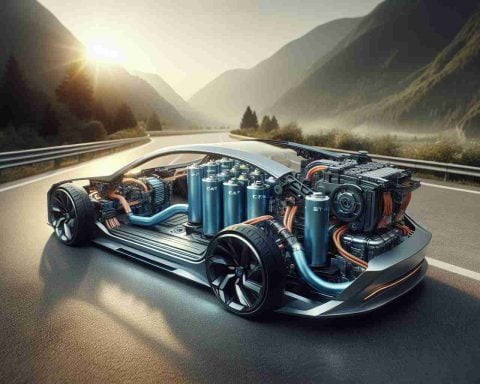Recent analysis from a prominent financial institution indicates a significant decline in lithium-ion battery costs, projected to hit $82 per kilowatt-hour (kWh) by 2026. This price point is crucial, as it will enable electric vehicles (EVs) to be competitively priced against traditional gasoline cars based on total ownership costs. The report attributes this anticipated decrease to advances in technology and a reduction in the costs of necessary materials.
The trend towards cheaper electric vehicles is essential, as consumer adoption largely hinges on affordability. Many individuals are reluctant to transition from conventional gas vehicles without a compelling financial incentive. The substantial drop in battery prices, which were around $149 per kWh in 2023, marks a dramatic shift from $780 per kWh in 2013, signifying a positive trajectory for the EV market.
Furthermore, analysts foresee that by the end of 2024, battery prices might further decrease to around $111 per kWh. This forecast bodes well not only for consumers but also for manufacturers, who face challenges in achieving profitability due to high battery costs. With new models like the affordable Chevy Equinox EV emerging, the market is gradually evolving to offer more options.
As these changes take effect, the landscape for electric vehicles will likely shift, providing consumers an economic rationale to consider switching from gas-powered vehicles, thereby fueling a resurgence in EV demand.
The Transformative Impact of Declining Lithium-Ion Battery Costs
The world is on the brink of a significant transformation in the automotive industry, driven by the declining costs of lithium-ion batteries, which have become pivotal in the shift towards electric vehicles (EVs). As reported recently, prices are anticipated to drop to $82 per kilowatt-hour (kWh) by 2026, a substantial decrease that will empower consumers and reshape communities and economies globally.
Shifting Consumer Perspective
The decreasing cost of lithium-ion batteries is crucial in changing consumer attitudes towards electric vehicles. Traditionally, potential buyers of EVs have been deterred by high upfront costs compared to their gasoline counterparts. However, as battery prices plummet—from $780 per kWh in 2013 to around $149 per kWh in 2023—the financial landscape for consumers is evolving. This shift means that EVs will soon be competitively priced, factoring in the total cost of ownership, thus providing consumers with the financial incentive they need to make the switch.
This change is not only essential for individual buyers but also for families in communities looking to save on fuel costs and reduce their carbon footprints. With the emergence of affordable models like the Chevy Equinox EV, more consumers are gaining access to electric mobility options.
Environmental Impact
The transition to electric vehicles, fueled by lower battery costs, has profound implications for environmental sustainability. EVs generate zero tailpipe emissions, which means a considerable reduction in air pollutants that contribute to health problems and climate change. An increase in EV adoption can help cities improve air quality and meet emissions reduction targets more effectively. As communities become more environmentally conscious, the cultural shift towards sustainability is expected to strengthen, with greater support for policies promoting green technologies.
Economic Implications for Communities
The economic effects extend beyond individual consumers to entire communities and countries. The shift towards EVs can reduce dependence on imported oil, enhancing energy security and potentially stabilizing fuel prices. Moreover, as the demand for EVs increases, so does the need for charging infrastructure, resulting in job creation in the installation and maintenance sectors. Countries that invest in EV infrastructure may witness economic booms in related industries, generating growth and fostering innovation.
However, this transition is not without its controversies.
Challenges and Controversies
Despite the promising outlook, various challenges and controversies surround the transition to electric vehicles. One of the main concerns is the environmental impact associated with lithium mining and battery production. Reports highlight that lithium extraction can lead to water scarcity and ecological degradation in some regions, raising questions about the sustainability of the materials used.
Additionally, there are debates regarding the energy sources used to charge EVs. While EVs are cleaner during operation, if the electricity comes from fossil fuels, the overall environmental benefits might be diminished. This complexity underscores the importance of a holistic approach to energy production and consumption.
Furthermore, the automotive industry itself is undergoing significant changes. Established manufacturers may struggle to adapt to the rapid evolution towards electrification, risking job losses in traditional auto manufacturing while potentially creating new ones in the EV sector.
In conclusion, as lithium-ion battery costs continue to decline, the ramifications across the economic, environmental, and societal spectrum are profound. With ongoing advancements and innovations, we stand at the precipice of vast change—one that could redefine mobility for generations to come.
For more information on advancements in battery technology and electric vehicles, visit Reuters.
The article has been updated. 2024-11-06 02:20
Edmunds – A comprehensive automotive resource providing reviews, pricing, and insights on electric vehicles and their affordability.
AutoTrader – A marketplace where users can buy and sell vehicles, featuring electric vehicle listings and affordability tips.
U.S. Department of Energy – The official government website that offers information on energy efficiency, including resources on electric vehicle incentives and affordability.
Green Car Reports – A news source focusing on the latest developments in electric vehicles, including affordability trends and technology advancements.
Forbes – A leading business publication that often covers economic trends related to electric vehicle pricing and market analysis.
Car and Driver – An automotive magazine that provides expert reviews, comparisons, and insights into electric vehicle affordability and performance.
NPR – National Public Radio provides news and reports on electric vehicles, including discussions on their affordability and environmental impact.
MotorTrend – A prominent automotive brand offering reviews, car comparisons, and rich content on electric vehicle pricing and future trends.
The Verge – A technology news site that discusses electric vehicle innovations and their implications on affordability and consumer access.
Electrek – A dedicated platform for electric vehicle news, focusing on pricing trends, new models, and industry insights related to EV affordability.
The article has been updated: 2024-11-06 14:42
What factors are contributing to the rise in affordability of electric vehicles (EVs)?
The affordability of electric vehicles is being driven by several key factors. First, advances in battery technology are leading to significant reductions in production costs, making EVs cheaper to manufacture. Second, increased competition among automakers is driving innovation and lowering prices. Third, government incentives and rebates aimed at promoting the use of electric vehicles are making them more accessible to consumers. Lastly, a growing availability of used electric vehicles is providing more budget-friendly options for consumers, further enhancing affordability.
















